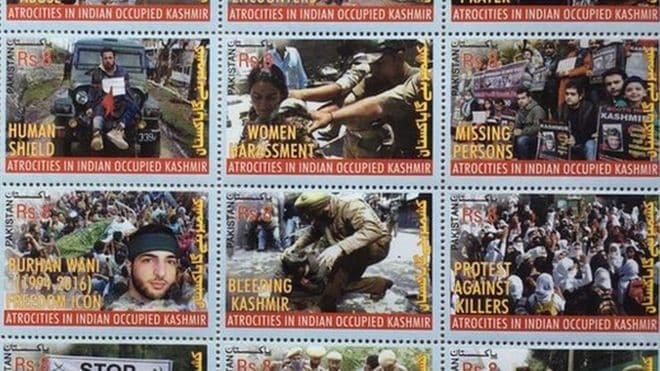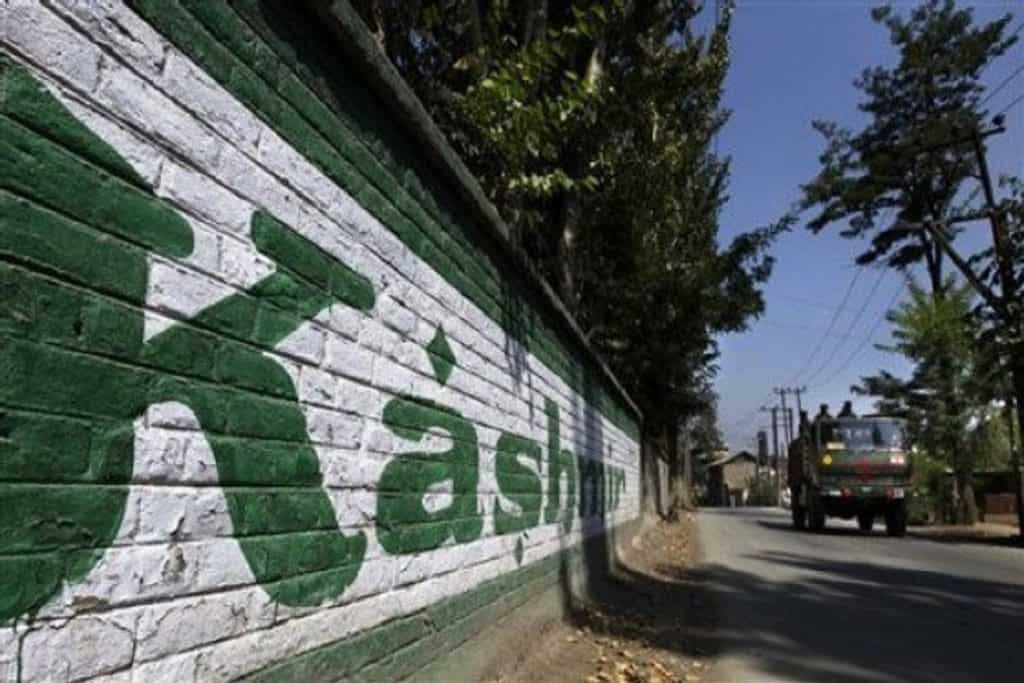The conflict over valley of Kashmir arose right after the inception of India and Pakistan in 1947. It is a disputed territory between these two states, as both made claims on region, based on the religious affiliation and history. This issue has vitiated the peace and political environment of South Asia and there has been no progress in the resolution of problem.
Kashmir enjoys significant geo political location. The valley is famous for its natural beauty, geographical significance and resources.it shares border with China, India, Pakistan and small part with Afghanistan. Presently it has been devastated due to confrontation between India and Pakistan, as the countries have adopted a rigid attitude and not willing to compromise on any proposed solution.
To understand the real causes of conflict, the chapter of Indian partition is essential to be referenced. When British rule ended in sub-continent, two new states emerge on the map of the world, i.e. Republic of India and the Islamic Republic of Pakistan. With British withdrawal, the colonial rule from the 562 princely states was also terminated and these states were given the liberty to choose either India or Pakistan. (Majid, 2016)
The state of Jammu and Kashmir was the largest princely state, with 90 % Muslim population and ruled by Hindu Maharaja. Pakistan tried to persuade the ruler to make accession with Pakistan, keeping in view the majority of Muslim population. Hari Singh was using delaying tactics, as he wants to keep an independent Kashmir. Since 1930, the subjects in Kashmir were raising voices against the cruel ruler, after independence, the movement become intense and many tribesmen invade the region. Upon this, Hari Singh rush towards India to sign an instrument of accession in return for military aid.
Freedom fighters from the western area of state made advances, while Indian army also enter into a theatre to counter raiders coming from Pakistan. This resulted in first war between India and Pakistan over Kashmir, which ended in 1948.
A ceasefire was achieved after the mediation of United Nations. The United Nation Commission of India and Pakistan (UNCIP), made effort to find a solution agreeable to both India and Pakistan. The report of the commission proposed the withdrawal of Pakistanis troops and nationals from the region, than India would withdraw its bulk of forces and after withdrawal of forces, a plebiscite will be held. This proposal was not acceptable to Pakistan.
Since then, two third of the princely state is controlled by India while one –third is administered by Pakistan. Kashmir is also a source of many water tributaries and rivers, which has further complicated the issue. (Chattha, 2014) As Sir Zafar-ullah Khan (Pakistani diplomat) said: “Kashmir is lifeline and key element of water security of Pakistan” (Sridha, 2008)
Two countries perspective over Kashmir is delaying the solution of the issue for several decades. For India, Kashmir is its integral part, as the instrument of accession of Jammu and Kashmir to India was completed, and Pakistan could not aspire to equal footing with India in this contest. India also deny the validity of UN resolution 47 on Kashmir, and consider it obsolete. Therefore, New Delhi believes that UN jurisdiction is non-binding on it, and after Simla Agreement 1972, India and Pakistan are supposed to settle their all differences through bilateral negotiations. (Sehga, 2011)
For Pakistan Kashmir is the ‘jugular vein of Pakistan’, and solution of the Kashmir issue should be made with the wishes of the people. Pakistan’s perspective is that Maharaja of Kashmir was a tyrant and unpopular among the subjects. At the time of instrument of accession by Maharaja to India, he was bound with the Standstill Agreement, which did not allow him to enter any agreement with other countries. Pakistan support the right of self-determinations of Kashmiris as enshrined in United Nations charter.
Pakistan maintains that Kashmiri population who is struggling for its legitimate rights cannot be branded as terrorists or separatists. The denial of right of self-determination to the Kashmiri people is a violation of basic clause of United Nation resolution. The insurgencies in Kashmir is a clear indication that Kashmiri population doesn’t wants to be a part of India , they either wants accession with Pakistan or wants to be independent. (Shafiq, 2015)
India is consistently violating the terms of UNSC’s resolution and failing to hold a plebiscite in the state to determine the future of Kashmir. As former, Indian Defense Minister Krishnan Menon said,
“Kashmir would vote to join Pakistan and no Indian government responsible for agreeing to plebiscite would survive.” (Snedden, 2006)
The borderline between India and Pakistan at Kashmir region is known as Line of Control (LoC). The violation of LoC is a regular practice on both sides. A series of border skirmishes has become norm of the day and both sides blame each other for initiating the hostilities.
Many proposals have been propose to resolve this intricate issue like Solution under the light of international law, Resolutions from United Nations, Chenab formula, Musharraf’s four-point peace formula, but nothing could be materialize.
There has been reported a constant violation of human rights in Indian held Kashmir, carried out by Indian security forces in the guise of counter terrorism activities. Human rights organizations are strongly condemning Indian government for human rights abuse of Kashmiris.
For long Islamabad and New Delhi have been locking horns over Kashmir. In July 2016, furious protests erupted in Indian held Kashmir, in the wake of Burhan Wani (Hizbul Mujahideen commander killing. According to BBC report, this was one of the bloodiest summer in Muslim dominated valley of Kashmir in recent years. A large number of civilian lost their lives in clashes under banner of Afspa. ‘Afspa’ is India’s Armed forces Special Power Act, which grant military extensive power to arrest, shoot, kill or destroy property.
The anti- India sentiments run deep into the local Kashmiris, which is multiplying India’s trouble. On September 13, 2018 an incident took place, where Indian soldiers dragging the half-naked bloodied body of a rebel.
The new Prime Minister of Pakistan Imran Khan said: “To move forward Pakistan and India must dialogue and resolve their conflicts including Kashmir: The best way to alleviate poverty and uplift the people of the subcontinent is to resolve our differences through dialogue and start trading.”
The Indian government agreed on talks but later on took a u turn by cancelling a proposed meeting between Foreign Minister of India Sushma Swaraj and her Pakistani counterpart, Shah Mahmood Qureshi, which should have been taken place on the sidelines of 73 UN General Assembly debate in September 2018.
Officials from New Delhi said they postponed the talks following the latest insupportable killings of our security personnel by entities/terrorists in Kashmir and said to be Pakistan-based. The release of Pakistani postage stamps dignifying a terrorist (Burhan Wani) and supporting terrorism was also part of that statement causing withdraw from talks by India.
The release of Pakistani postage stamps dignifying a terrorist (Burhan Wani) and supporting terrorism was also part of that statement causing withdraw from talks by India.
Diplomats from India and Pakistan aired their differences over the disputed region of Kashmir at the debate in the 73rd session of UN General Assembly
Pakistan FM Shah Mehmood Qureshi said
“We wanted to sit with India to discuss all issues, including terrorism, that have created violence in our cities and towns, and have led to tens of thousands of casualties of innocent Pakistanis. Pakistan shall never forget the mass murder of more than 150 children in a Peshawar School, the terrible Mastung attack and many others that have links with terrorists supported by India.”
“We have in our custody a serving Indian Naval officer, Commander Kalbhushan Yadav, who has provided us with the most incriminating evidence by accepting that he, on the instructions of his government, financed, planned and executed acts of terrorism and violence in Pakistan. This is but one Indian state sponsored official terrorist.”
Meanwhile Indian FM Sushma Swaraj stated during her speech that
“Time and again, Pakistan accuses India of human rights violations. Those who take innocent human lives in pursuit of war by other means are defenders of inhuman behavior, not of human rights. Pakistan glorifies killers; it refuses to see the blood of innocents.”
“Our neighbor’s expertise is not restricted to spawning grounds for terrorism; it is also an expert in trying to mask malevolence with verbal duplicity. The most startling evidence of this duplicity was the fact that Osama Bin Laden, the architect and ideologue of 9/11 was given safe haven in Pakistan.”
So progress on the issue of Kashmir seems extremely difficult to achieve. It is hard time for both India and Pakistan, but both states must come forward with practical, rational, feasible and urgent solution to this prolong crisis. Without resolving this issue, peace in South Asia region cold remains a myth.







